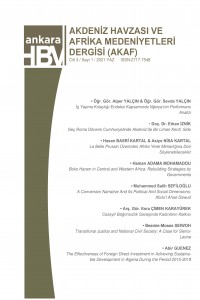Öz
Destekleyen Kurum
No Applicable
Proje Numarası
No Applicable
Teşekkür
No Appliable
Öz
National civil society has played an integral role in the promotion and support of transitional justice processes in countries and societies that have emerged from protracted armed conflict and repressive authoritarian regimes. These processes have been used to hold national governments to account for human rights violations and international crimes, raise awareness and mobilise society to participate in transitional justice processes, and provide a range of services to victims and witnesses of human rights violations. In the case of truth commissions, they have also been involved in monitoring and disseminating the outcomes and lessons learned from transitional justice processes to a wider national audience. Furthermore, they have been advocating with national governments and developmental partners to implement the recommendations of the truth commissions. The roles of national civil society in transitional justice processes have been captured in three phases: prior conception and formation, and operations and post-transitional justice processes. There has been little examination of the critical roles played by civil society in these three phases, particularly in Sierra Leone.
Therefore, this article provides an overview of the concept of civil society and its role in transitional justice in post-conflict countries, or countries which are emerging from repressive authoritarian regimes. Second, it more broadly examines Sierra Leone’s dual transitional justice approach and the role of national civil society in achieving transitional justice in Sierra Leone, the challenges encountered, and recommendations to be considered for future transitional justice initiatives.
Anahtar Kelimeler
Proje Numarası
No Applicable
Ayrıntılar
| Birincil Dil | İngilizce |
|---|---|
| Bölüm | Araştırma Makaleleri |
| Yazarlar | |
| Proje Numarası | No Applicable |
| Yayımlanma Tarihi | 30 Haziran 2021 |
| Yayımlandığı Sayı | Yıl 2021 Cilt: 3 Sayı: 1 |
Dergimiz, Akdeniz Havzası ve Afrika’ya ilişkin tarih, kültür, siyaset, ekonomi, edebiyat, sosyoloji ve uluslararası ilişkiler gibi geniş bir yelpazede akademik çalışmalara yer vermektedir. İlgili alanlarda özgün araştırmalarını yayımlamak isteyen akademisyenler, araştırmacılar ve uzmanlar makalelerini gönderebilirler.
Makalelerin değerlendirme süreci, bilimsel etik kurallar çerçevesinde kör hakemlik sistemi ile yürütülmektedir. Yayımlanmak üzere gönderilecek makalelerin, dergi yazım kurallarına uygun olarak hazırlanması gerekmektedir.

